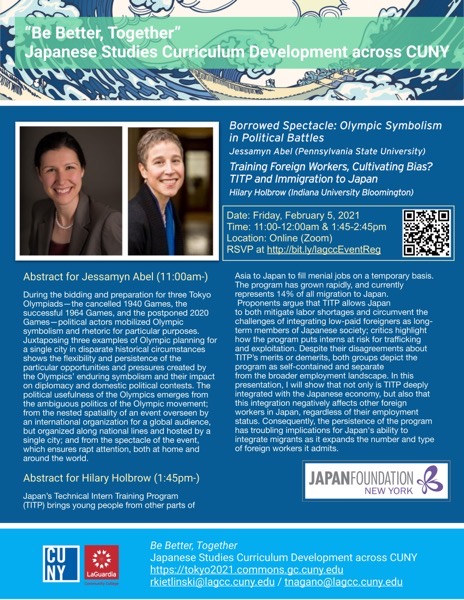“Be Better, Together” Japanese Studies Curriculum Development across CUNY is pleased to host two talks by Jessamyn Abel & Hilary Holbrow on Friday, February 5, 2021. These virtual talks (via Zoom) are open to public. See the details below.
- Date: Date: Friday, February 5, 2021
- Time: 11:00-12:00am & 1:45-2:45pm
- Place: Zoom
- URL: http://bit.ly/lagccEventReg
Abstract for Jessamyn Abel (11:00am-) / Jessamyn Abel (Pennsylvania State University)
During the bidding and preparation for three Tokyo Olympiads—the cancelled 1940 Games, the successful 1964 Games, and the postponed 2020 Games—political actors mobilized Olympic symbolism and rhetoric for particular purposes. Juxtaposing three examples of Olympic planning for a single city in disparate historical circumstances shows the flexibility and persistence of the particular opportunities and pressures created by the Olympics’ enduring symbolism and their impact on diplomacy and domestic political contests. The political usefulness of the Olympics emerges from the ambiguous politics of the Olympic movement; from the nested spatiality of an event overseen by an international organization for a global audience, but organized along national lines and hosted by a single city; and from the spectacle of the event, which ensures rapt attention, both at home and around the world.
Abstract for Hilary Holbrow (1:45pm-) / Hilary Holbrow (Indiana University Bloomington)
Japan’s Technical Intern Training Program (TITP) brings young people from other parts of Asia to Japan to fill menial jobs on a temporary basis. The program has grown rapidly, and currently represents 14% of all migration to Japan. Proponents argue that TITP allows Japan to both mitigate labor shortages and circumvent the challenges of integrating low-paid foreigners as long- term members of Japanese society; critics highlight how the program puts interns at risk for trafficking and exploitation. Despite their disagreements about TITP’s merits or demerits, both groups depict the program as self-contained and separate from the broader employment landscape. In this presentation, I will show that not only is TITP deeply integrated with the Japanese economy, but also that this integration negatively affects other foreign workers in Japan, regardless of their employment status. Consequently, the persistence of the program has troubling implications for Japan’s ability to integrate migrants as it expands the number and type of foreign workers it admits.



